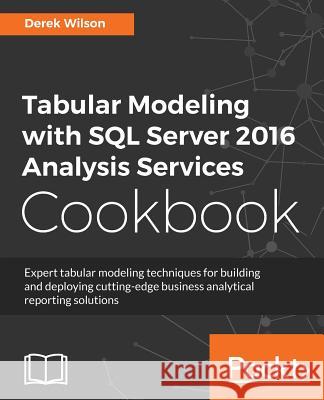Tabular Modeling with SQL Server 2016 Analysis Services Cookbook » książka
Tabular Modeling with SQL Server 2016 Analysis Services Cookbook
ISBN-13: 9781786468611 / Angielski / Miękka / 2017 / 372 str.
Expert tabular modeling techniques for building and deploying cutting-edge business analytical reporting solutions About This Book - Build and deploy Tabular Model projects from relational data sources - Leverage DAX and create high-performing calculated fields and measures - Create ad-hoc reports based on a Tabular Model solution - Useful tips to monitor and optimize your tabular solutions Who This Book Is For This book is for SQL BI professionals and Architects who want to exploit the full power of the new Tabular models in Analysis Services. Some knowledge of previous versions of Analysis services would be helpful but is not essential. What You Will Learn - Learn all about Tabular services mode and how it speeds up development - Build solutions using sample datasets - Explore built-in actions and transitions in SSAS 2016 - Implement row-column, and role-based security in a Tabular Data model - Realize the benefits of in-memory and DirectQuery deployment modes - Get up to date with the new features added to SQL Server 2016 Analysis Services - Optimize Data Models and Relationships Usage In Detail SQL Server Analysis Service (SSAS) has been widely used across multiple businesses to build smart online analytical reporting solutions. It includes two different types of modeling for analysis services: Tabular and Multi Dimensional. This book covers Tabular modeling, which uses tables and relationships with a fast in-memory engine to provide state of the art compression algorithms and query performance. The book begins by quickly taking you through the concepts required to model tabular data and set up the necessary tools and services. As you learn to create tabular models using tools such as Excel and Power View, you'll be shown various strategies to deploy your model on the server and choose a query mode (In-memory or DirectQuery) that best suits your reporting needs. You'll also learn how to implement key and newly introduced DAX functions to create calculated columns and measures for your model data. Last but not least, you'll be shown techniques that will help you administer and secure your BI implementation along with some widely used tips and tricks to optimize your reporting solution. By the end of this book, you'll have gained hands-on experience with the powerful new features that have been added to Tabular models in SSAS 2016 and you'll be able to improve user satisfaction with faster reports and analytical queries. Style and approach This book takes a practical, recipe-based approach where each recipe lists the steps to address or implement a solution. You will be provided with several approaches to creating a business intelligence semantic model using analysis services.











